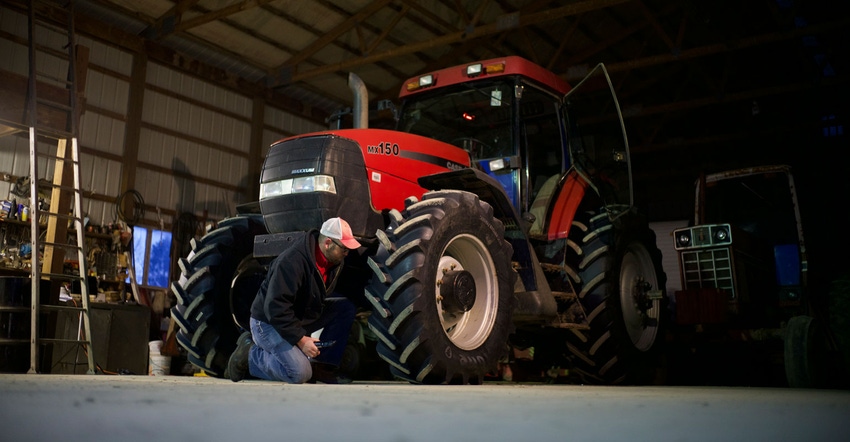December 15, 2020

With cold weather ahead, have you thought about your farm tires? That’s what Brad Harris has done, but he is paid to do it. Harris is manager of agricultural field engineering at Firestone Ag, and when it comes to farm winter tire care, he has some tips that can preserve your investment.
“When I talk about winter care, I am thinking about the Upper Midwest and locations where temperatures get below freezing — and you’re either trying to use a piece of equipment for livestock work, or you are storing that machine,” he says.
No matter the brand of farm tire you own, Harris’ tips can be applied on your farm, and he shares some ideas you may have known, but have forgotten over the long summer.
Going into storage
“When you're putting equipment into storage, I recommend doing an inspection of those tires before we put the machine away,” Harris says. If you notice damage to a tire, or two, winter can be a good time to schedule a replacement.
Harris notes it might be a good time to capture savings from an end-of-year sale, or a winter special. And you’re taking care of that tire in a “scheduled” manner, rather than under an emergency. That can save on service costs, too.
“If you’re storing the machine for long, I encourage customers to set them [tires] to the maximum inflation pressure,” he says. “Those tires naturally lose air through the year. Filling those tires to max pressure means you won’t be walking into the shed next spring to a flat tire. That makes it easier to start prepping for planting season.
Another tip he offers, if you have your tires filled with calcium chloride, is to park them so the valves are at 12 o’clock. “If those valves are lower, moisture might get in and freeze, which can open the valve,” he says. “We’ve seen leakage from this when the valve fails.”
Harris is quick to add that trying to line up valves when parking a machine for storage may not be top of mind, nor easy. He notes getting the valves above 3 and 9 in position can help, too.
He adds that if you had a muddy harvest, it’s a good idea to make sure all mud has been removed from between dual-wheel assemblies. If that mud is really packed in there on a combine or tractor, it can be a problem. “The freeze-thaw of that mud can damage the wheel or break lug bolts,” he says.
Equipment at work
For livestock producers who use machines year-round, Harris offers some insight for maintenance.
H notes that a pasture that was muddy and filled with ruts and hoofprints presents a different tire danger when frozen. “Those humps and mounds that cattle make walking through a wet pasture turn into little rocks, and some are big enough to create impact breaks on tires,” he says. “It can be like running in a rock quarry.”
He advises working to make sure that the path you use to transport bales into a pasture is smooth.
And if you’re spreading manure in winter over cornstalk ground, Harris adds that those stalks — which are strong in summer — are even tougher when frozen. “They're like fence posts covered with snow and can puncture a tire extremely easily,” he notes. “Soybean stalks get harder when frozen, too.”
Harris says that’s why an investment in a stalk-crushing tool used at harvesttime can more than pay for itself in saved tires.
As for those rock-hard bumps? Harris says he’s seen examples — and you can search for them on Google — of tires that hit those, and the body ply will break on the interior of the tire, but the exterior will look fine until it starts to balloon with air pressure. “That’s one of the weirdest things we’ve seen,” he says.
Winter is hard on all your equipment. A few early precautions can offer a solid payback.
About the Author(s)
You May Also Like






